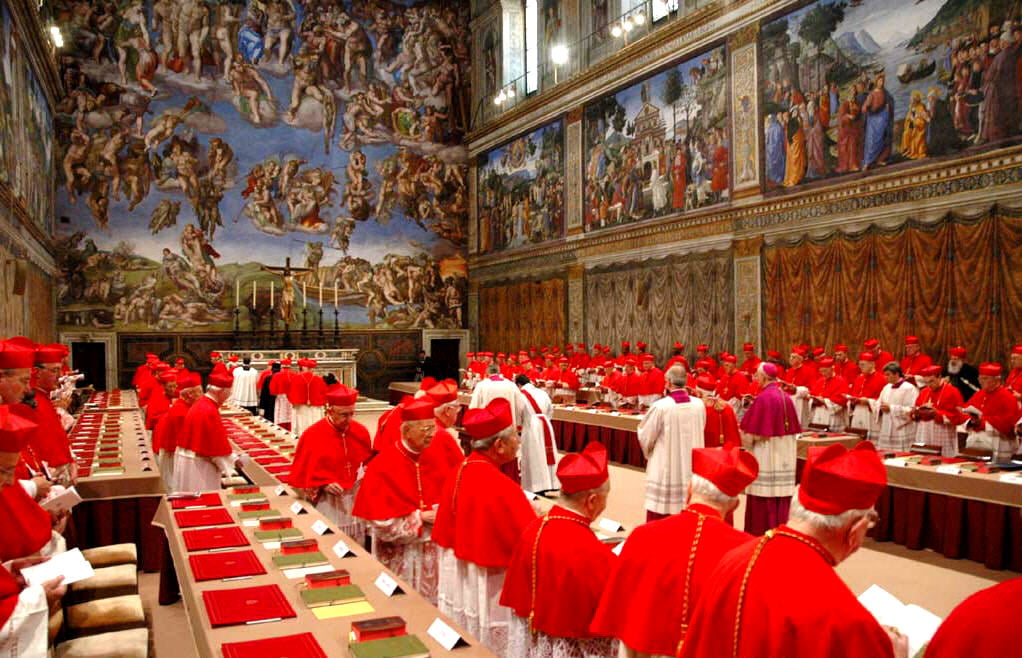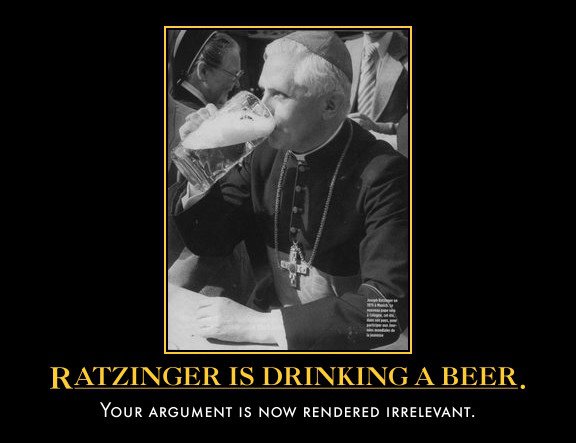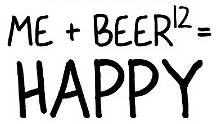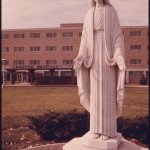Choosing future popes prior to them being voted into office by the Papal Conclave is a great pastime, even if the odds of guessing correctly are long.
When Cardinal Joseph Ratzinger was elected by the conclave to assume command of the Barque of Saint Peter after the passing on to eternity of Blessed Pope John Paul II, nobody expected him to be named the Pope. It was like a bolt out of the blue, or like a bolt of lightning hitting St. Peters Basilica this morning.
This fact, along with a study of history, is why author John Allen Jr. of NCR’s All Things Catholic could say the following words with confidence,
“The trash heaps of history…are littered with supposed experts who tried to predict the next Pope.”
But my method is surefire, and scientific, you see. John Allen just doesn’t know Joe Six-Pack, nor my methods. And he doesn’t know that although I wasn’t a Catholic during the last change of command ceremony, future Popes can be identified by looking at photographs of Cardinals and finding the ones who share a signal quality that points to them being even nominated for the Seat of Saint Peter. He doesn’t know that I am going to enlist you in the search for the future pope, either. So what’s the angle?
Would you believe me if I said it has to do with beer? St. Brigid, pray for us.
Consider this, dear reader.
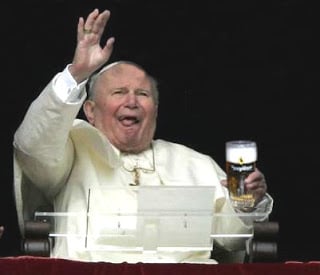
What’s that? It doesn’t count unless I have a picture of a future Pope drinking beer as a Bishop or as a Cardinal? That is the method, entirely.
So, you see, while other folks start comparing candidates based on their holiness, theological acumen, age, smarts, or New Evangelization bonafides, my method looks for the Cardinals who are proudly drinking beer in public.
This is where you come in. Some would have us believe that our next Pope comes from the following list of contenders. Take a look at the list of candidates. The list will show two things. 1) The diversity of the Catholic Cardinals and 2) the ubiquity of beer!
The 12 Leading Papal Candidates and their Home Brews
Cardinal Marc Ouellet
Archbishop of Quebec, CanadaNoted for his cheerful, open, and humble persona, as well as his uncompromising orthodoxy, Cardinal Ouellet often is regarded as the cardinal to watch for the future. Last year, Pope Benedict chose him to chair a synod of bishops on the Bible — often a sign of a favored successor. The 64-year-old reportedly excelled in the role, called “relator,” while managing a major international congress for the Church in Quebec that same year. Surrounded by liberal bishops and radical secularism, he has remained one of the staunchest defenders of the Catholic faith in the Canadian hierarchy. An author of many books, he is a proficient linguist.
Cardinal Angelo Scola
Patriarch of Venice, ItalyOnce considered a long shot to succeed John Paul II, Cardinal Scola has emerged as a front-runner to follow Benedict XVI because of his pastoral energy and theological expertise. An eminent scholar, he has striven to find ways to avoid a “clash of civilizations” through building a forum for dialogue and encounter between the West and Islam. The 67-year-old son of a truck driver is ebullient and multilingual. Sometimes his intellectual depth can confound even the most erudite of theologians. If elected, he would follow three Venice patriarchs who went on to become Pope in the 20th century: Pius X, John XXIII, and John Paul I.
Cardinal Jorge Mario Bergoglio
Archbishop of Buenos Aries, ArgentinaIf elected, this runner-up in the last conclave would be the first Jesuit to reach the highest seat in the Catholic Church. A very pastoral, humble, and simple priest who is happy using public transportation and shuns interviews, he probably would opt for a quiet life as Peter’s successor. Not a fan of bureaucracies, he’s said he’d be reluctant to live at the Vatican. But if his record in Argentina is an indicator, he would be a redoubtable defender of Catholic identity and orthodoxy. Now 72, he studied chemistry before entering the priesthood and is said to speak Spanish, Italian, and German.
Cardinal Christoph Schoenborn
Archbishop of Vienna, AustriaA member of a prominent aristocratic Austrian family that produced two cardinals in the 18th and 19th centuries, Cardinal Schoenborn has long been a rising star in the Catholic Church. He was considered a serious candidate for Pope during the 2005 conclave but was thought too young. Now 64, the former student of Benedict XVI still is relatively young but that may run in his favor this time. Above all, he has had extensive experience of defending the Church in the face of radical secularism in Austria. Multilingual, he recently called for a reform of the Vatican’s internal communications.
Cardinal Ivan Dias
Prefect, Congregation for the Evangelization of PeoplesExperience as an archbishop, a Vatican diplomat, and long service as an official in the Roman Curia make this Indian prelate arguably the ideal papal candidate from the developing world. But his low profile (he almost never gives interviews) means he is little known, even in his native India. The 73-year-old has served at Vatican embassies in Scandinavia, Indonesia, and Madagascar, and is said to speak a dozen languages. He is responsible for maintaining the Church’s missionary activity around the world, and it is so important that he is known as the “Red Pope.”
Cardinal Wilfrid Fox Napier
Archbishop of Durban, South AfricaCardinal Napier, a Franciscan, has been tipped as a potential black African Pope for some time. Charismatic, humble and pastorally effective, he is a keen advocate of social justice, is doctrinally sound and is a vigorous opponent of abortion. He grew up on a South African farm with seven siblings during the apartheid era. He even opposed a papal visit to the country in 1988 saying it would give legitimacy to the white-dominated government. He has also been a firm backer of the Church’s teaching against condom use in preventing AIDS.
Cardinal Angelo Bagnasco
Archbishop of Genoa, ItalyA firm and loyal friend of Benedict XVI, Cardinal Bagnasco, 66, has emerged as a doughty yet softly spoken and deeply pastoral leader of the Church in Italy. His meteoric rise is testament to his abilities. Appointed archbishop of Genoa in August 2006, Benedict XVI chose him to head the Italian bishops’ conference a year later and made him a cardinal. His strength of character was shown in his same-sex union condemnation in 2007, a battle the Italian Church eventually won but led to death threats against him and brought about the presence of armed guards. He often has defended the Pope vigorously in the face of controversy.
Cardinal Oscar Rodriguez Maradiaga
Archbishop of Tegucigalpa, HondurasIf the cardinals were to choose someone with a more liberal-leaning outlook, the 66-year-old Cardinal Maradiaga would be their man. He has long been one of Latin America’s leading voices in the College of Cardinals, especially on social-justice issues. He once called poverty and social injustice the real “weapons of mass destruction” and said globalization is creating a world in which “the greediness of a few is leaving the majority on the margin of history.” He is most popular in Latin America, home to 40 percent of the world’s Catholics. He is also good with the media, speaks eight languages, and plays the saxophone.
Cardinal George Pell
Archbishop of Sydney, AustraliaA no-nonsense Australian who takes an uncompromisingly conservative position on social issues, Cardinal Pell, 67, would delight conservative and traditionalist members in the Church if he were elected. Since being elevated to cardinal in 2003, he has taken a high profile on a wide range of issues, while adhering strictly to Catholic orthodoxy and supporting traditional liturgy. He rose to prominence at the World Youth Day the Pope attended in Sydney last year. A climate change skeptic, he once criticized “hysteric and extreme claims” about global warming as a “symptom of pagan emptiness.” Warm hearted and with a wry sense of humor, Pell stands more than 6 feet tall and is a keen sports fan and a former rugby player.
Cardinal Jose Saraiva Martins
Prefect Emeritus, Congregation for the Causes of SaintsHad there been a stalemate between Cardinal Ratzinger and his nearest rival, Cardinal Bergoglio, during the last conclave, the compromise candidate would have been Cardinal Saraiva. His warmth and holiness have brought him much respect among officials at the Vatican, where the Portuguese cardinal worked until recently. A keen soccer fan, the 77-year-old headed the Vatican’s education department for many years before being appointed to oversee saints causes. But his age and his inability to speak English could work against him.
Cardinal Peter Kodwo Appiah Turkson
Archbishop of Cape Coast, GhanaWhen he was elevated to the cardinalate by John Paul II in 2003, Cardinal Peter Turkson became one the youngest princes of the church. At just 60 years old, he has already made his mark as a champion of Christian unity, interreligious dialogue and the Church in Africa. A proficient linguist (he speaks six languages), his abilities have already been noted by the Pope: In February, Benedict XVI appointed him to be the recording secretary for the upcoming Synod of Bishops on Africa in October. A U.K. Catholic magazine described him in 2005 as “one of Africa’s most energetic Church leaders.”
Cardinal Norberto Rivera Carrera
Archbishop of Mexico CityCardinal Rivera heads the world’s largest Catholic archdiocese, with a population of 7 million. He has criticized Mexico’s drug cartels sharply and most recently backed calls for tougher laws after an increase in drug-related violence. He also has spoken out against government corruption and complicity in the drug trade, and he has called on the United States to join forces against the problem. A few years ago, he criticized the U.S. for “xenophobic attitudes” toward Mexican immigrants. Cardinal Rivera, 66, is conservative doctrinally and, like Cardinal Pell, could be counted on to defend the Church vigorously in the face of radical secularism.
The Long-Shot Contenders
Top picks for pontiff usually come from the ranks of the cardinals who are closest to the line of succession at the Vatican. But there’s an old Roman saying about papal conclaves: “The next Pope is not yet a cardinal.”
Among those who could see their stock rise between now and the next papal election are:• Archbishop [sic] Gianfranco Ravasi (ed. Cardinal, 11/20/2010), an Italian biblical scholar who heads of the Vatican’s council for culture.
• Monsignor Pietro Parolin, another Italian considered in Rome’s diplomatic circles to be a first-class diplomat. He has made concrete advances in bettering the Church’s relations with Vietnam and China.
• Archbishop [sic] Raymond Burke (ed. Cardinal, as of 12/04/2010), the lone American on the list, the former archbishop of St. Louis who recently was appointed head of the Church’s “Supreme Court”
and is expected widely to be made a cardinal soon. — E.P.
Check the list over at Business Insider too. Or you could start throwing darts at the entire list of Cardinals too.
Your mission, dear readers, is to scour the globe and find me photographs of any of the above named clerics enjoying a beer. Add the photo link to the combox (or post it on the blog Facebook page), and perhaps the list of future popes will become clearer. If you can’t find a photo of them enjoying a beer, then the odds are that they will not even make the papal ballot. There is a mathematical formula that will prove this.
What if that saying “The next Pope is not yet a cardinal” is true? Hmmmm.
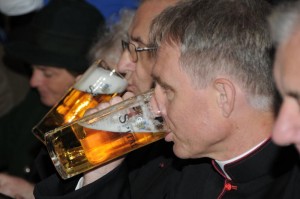
UPDATEs:
From Irish bookmakers to the “beer tell,” there is something for everyone here:PopeWatch 2013.
Brandon Vogt notes then Cardinal Ratzinger’s answer on how the Holy Spirit works through the conclave,
Over the last couple days I’ve heard many people say, “STOP speculating on who the next pope will be! The Holy Spirit chooses the pope, not us. Leave it to Him!”
Yet interestingly, back in 1997, our current Pope offered a different view. On Bavarian television he was asked whether the Holy Spirit is responsible for electing the pope. Cardinal Ratzinger replied:
“I would not say so, in the sense that the Holy Spirit picks out the pope. … I would say that the Spirit does not exactly take control of the affair, but rather like a good educator, as it were, leaves us much space, much freedom, without entirely abandoning us. Thus the Spirit’s role should be understood in a much more elastic sense, not that he dictates the candidate for whom one must vote.
Probably the only assurance he offers is that the thing cannot be totally ruined. There are too many contrary instances of popes the Holy Spirit would obviously not have picked.”
Sounds a lot like a random walk.

